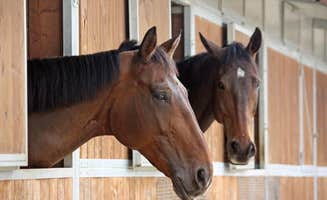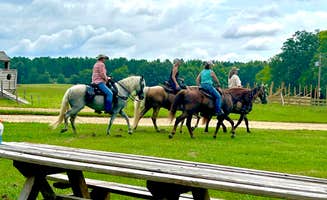Equestrian camping near Hartselle, Alabama provides access to diverse trail systems across Bankhead National Forest and surrounding areas. The region's typography ranges from limestone bluffs to creek beds with elevation changes between 500-1,500 feet. Trail conditions vary seasonally, with winter and early spring bringing higher water levels that can affect creek crossings, while summer temperatures typically range from 85-95°F with high humidity.
What to do
Trail exploration by horseback: Sipsey Wilderness area contains numerous backcountry riding options with intersecting waterways. "Sipsey Wilderness is a protected but unmaintained area in Northwest Alabama that is well known for its intersecting creeks, streams, and rivers that play together with the many waterfalls and magical rock faces," notes Asher K. about the Sipsey Wilderness Backcountry Site.
Fossil hunting along creek beds: Several locations offer opportunities to discover ancient marine fossils. "Did I mention fossils? All over the place some of the oldest creatures to crawl the earth are there for you to find! I'm not kidding we saw trilobites everywhere along the creek," reports Bruce G. from Red Coach Resort.
Swimming and water activities: During summer months, several parks offer swimming facilities for cooling off after trail rides. "In the summer the pool is open which is great for the hot days. There's also a track, a baseball field, and soccer fields so I've seen many athletic events held there," describes M&P M. about Sharon Johnston Park.
What campers like
Direct trail access from campsites: Many equestrians value the ability to ride directly from camp. "The multiple trails are so beautiful. I have been here many times," shares Belinda H. about Faye Whittemore Farms, adding that "the campground is very nice and woodsy. The campsites have water and electric hookups. They have nice paddocks for your horses."
Diverse terrain for all skill levels: The area offers riding opportunities from beginner-friendly flat trails to more challenging routes with elevation changes. "Different times of year provide completely different experiences whether its the exciting and boundless blooms of spring, the overgrown wild of summer, the bold and expansive colors of fall, or the high river levels and easy boating access of winter," notes Asher K. about the Sipsey Wilderness.
Year-round water availability: Many equestrian camps maintain reliable water sources regardless of season. "This is off the beaten path a bit, but it has its perks. Here you can find potable water from the spickets all year long," explains Gregg G. about Owl Creek Horse Camp.
What you should know
Seasonal considerations: Each season brings different riding conditions and challenges. "Just make sure to always do your research and plan ahead since it can change so drastically depending on when you go. My favorite is either fall or spring since the summer can be particularly hot and buggy," advises Asher K..
Limited amenities at wilderness sites: Most equestrian camping areas provide basic facilities only. "The campground doesn't have much in terms of amenities but if you prefer a little more you can stay at Brushy lake nearby," notes Asher K.
Noise considerations: Some camping areas have unexpected noise sources. "Just a note, there is a gun range across the street and down the road. You can hear people practicing when it's open but it's in the distance," mentions M&P M. about Sharon Johnston Park.
Tips for camping with families
Choose developed campgrounds for amenities: Family-friendly options offer more facilities. "It's a great site to bring the kids. In the summer the pool is open which is great for the hot days," recommends M&P M. about Sharon Johnston Park, adding that "there is a playground with different equipment for all ages."
Look for open play spaces: Some campgrounds provide room for children to explore safely. "When we go, our kids run free -- there are 200 acres of open space and a lake so they have a great time -- and there is a Pioneer Village they can explore," describes M&P M.
Consider first-time camping locations: Certain sites are more beginner-friendly. "We loved Sharon Johnson. Really good camp for littles and good spot for first time campers. Camp host was awesome. We will go back," shares Ron M.
Tips from RVers
Site selection for privacy: RV sites vary widely in spacing and privacy levels. "There are three rows of sites and the best ones in my opinion are the ones located against the treeline/creek. There are pull-through sites, but they were closer together and out in the open," advises M&P M.
Cell service availability: Mobile coverage varies throughout the region. "We did have poor coverage for our mobile data but the phones and texting always worked," notes Bruce G., while others report adequate service at selected campgrounds.
Hookup considerations: Electric and water availability differs between campgrounds. "The campground is very nice and woodsy. The campsites have water and electric hookups," describes Belinda H. about Faye Whittemore Farms, providing options for those requiring power.



